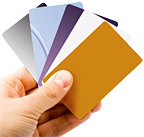Putting Your Finances in Order
Consider the Consequences of Credit Cards?
By Stanley Greenfield
This article is the beginning of a "catch-all" series dealing with the financial questions most people have but don't know who to ask or where to go to get a straight answer. This month's article deals with credit cards, those magical pieces of plastic that can get us anything we want, including total financial ruin and yes, poor health. Don't underestimate the connection between finances and health. If you're like most people, you worry about finances all the time, which leads to considerable stress - and stress is a major contributor to a variety of health conditions. Not to mention that the better positioned you are financially, the more prepared you are to handle those unexpected health crises and insurance headaches that can leave you with big bills. Credit Cards: A Blessing or a Curse? Ah, the credit card - the "I want it, I need it now!" generation finally has found the answer to its dreams. A little piece of plastic can go a long way; sometimes too long. However, after all the negative statements have been said, credit cards actually have some redeeming features. This is one area that many have opinions about, but no straight answers. Credit cards can be your friends if used properly, or they can bury you. What do I mean? Most people are walking around with a "pocket full of plastic" and don't have a clue what they are paying for all of that plastic. Know Your Interest Rate
 I have seen interest charges as low as 0 percent and as high as 39 percent. Where are you on that totem pole? Not sure? That's your first big mistake. You need to be sure! It's time you did a little homework to save yourself from financial ruin or even bankruptcy. Pull out your most recent credit card statements and look in the lower left-hand corner. What's your annual percentage rate or APR? Unless your credit score is lower than your IQ, you should not be paying more than 12 percent. If it's higher than that, it's time to look on that statement for the "800" number and give your credit card company a call. When you call, don't ask, but tell them you have been a good customer and if they want to keep you as a customer they need to do two things:
I have seen interest charges as low as 0 percent and as high as 39 percent. Where are you on that totem pole? Not sure? That's your first big mistake. You need to be sure! It's time you did a little homework to save yourself from financial ruin or even bankruptcy. Pull out your most recent credit card statements and look in the lower left-hand corner. What's your annual percentage rate or APR? Unless your credit score is lower than your IQ, you should not be paying more than 12 percent. If it's higher than that, it's time to look on that statement for the "800" number and give your credit card company a call. When you call, don't ask, but tell them you have been a good customer and if they want to keep you as a customer they need to do two things: - Lower your interest rate
- Increase your credit limit
They may say they just can't do that, but 70 percent of those who call and make those requests, get them. That is why you must tell them. If you ask politely, they will just ignore you. It's time to get tough because it can save you a bundle of money - and that bundle is better in your pocket than in theirs. At this point, you may be wondering why I also told you to request an increase in your credit limit. The reason is because all of your credit cards won't go along with your request for a lower interest rate. So, once this entire exercise is completed, you are going to dump the ones that won't lower your rate and move the balances to the ones that will. The next step is to cancel those "bad" cards in writing and request written notification that each card has been cancelled. This is important because you don't want them to appear on your credit report as "potential" lenders. Avoid Annual Fees
 But wait, there's even more you need to know about those pieces of plastic in your wallet. If you have a card for a specific airline because they give you miles, it's not a good deal. The annual fees on those cards are very high - usually between $60 and $90 per year. The interest charges are also very high at 16 percent to 19 percent. This is a very expensive way to get a free ticket when all the fees and interest are applied. Many cards will give you miles not limited to any one airline and the interest rates are reasonable - if you've called and told them to lower the rate below 12 percent. You may not even need to pay an annual fee.
But wait, there's even more you need to know about those pieces of plastic in your wallet. If you have a card for a specific airline because they give you miles, it's not a good deal. The annual fees on those cards are very high - usually between $60 and $90 per year. The interest charges are also very high at 16 percent to 19 percent. This is a very expensive way to get a free ticket when all the fees and interest are applied. Many cards will give you miles not limited to any one airline and the interest rates are reasonable - if you've called and told them to lower the rate below 12 percent. You may not even need to pay an annual fee. Another thought on those dreaded hunks of plastic is the so-called "semi-precious cards" that come in a variety of silver, gold, platinum and the latest, jet black. For what they offer in benefits, the higher annual fees are not justifiable. They look impressive when you pull them out of your wallet, but they really aren't worth the additional dollars you will spend year after year. Just another thought to keep in mind while you are culling your crop of plastic. Buy Now, Pay Later? Now that we've discussed all of the negatives about credit cards, here are some positives to leave you with. Credit cards do give you the benefit of playing the same game banks have played for years with our money: "the float." You buy an item on the 1st of the month and pay for it with a credit card. Your bill comes in on the 25th of the month and you have a "grace period" before being charged any interest. Let's assume you can stretch out this period until the 15th of the following month. That gives you a full one and a half months before you have to give up some of your hard-earned cash for an item you have used during that period of time for free. This is called playing the float - using someone else's money literally for free. Not a bad deal. The banks have been doing that to us for years and have made billions on us. It's time we returned the favor. Just make sure you don't abuse the privilege. (By the way, I don't like debit cards. Why, you ask? They have no float. You whisk that card through the machine and within minutes, your money is whisked out of your account to the bank. No float to you, and a big benefit to your bank.) The Dangers of Abuse Are you abusing your credit cards? According to the financial planning section of About.com, here are some of the warning signs: - Do you have more than two or three credit cards in your wallet?
- Do you pay the minimum (or less) every month?
- Are any of your credit cards maxed out or nearly at their limit?
- Do you hold off sending in other bills so you can pay the monthly payments on your credit cards?
- Do you charge items you used to pay for with cash?
- Do you send in payments late or miss payments?
- Have you taken out a loan to pay off a credit card, but then continue to charge things to the card?
- Do you take out cash advances on your credit cards to pay other bills?
 I did start off by saying that credit cards do have some benefits and I really mean that. Right now, they might be your best source of financing anything. Finance and leasing rates are not cheap, and you must start paying on them as soon as the deal is signed. You also have a limited period of time to pay all the money back. Credit cards usually give you a lower interest rate and the terms are much better. It's worth comparing before you sign on any finance or leasing plan. It could save you a bundle.
I did start off by saying that credit cards do have some benefits and I really mean that. Right now, they might be your best source of financing anything. Finance and leasing rates are not cheap, and you must start paying on them as soon as the deal is signed. You also have a limited period of time to pay all the money back. Credit cards usually give you a lower interest rate and the terms are much better. It's worth comparing before you sign on any finance or leasing plan. It could save you a bundle. There you have it: my dissertation on the good, the bad and the ugly pertaining to those deadly pieces of plastic referred to as credit cards. So, the next time an advertisement asks you, "What's in your wallet?" you will know the answer and understand what it means in terms of your finances. As I said earlier, this is the first article in a series intended to help get your finances in order. Future articles will cover such topics as: - Banks. Those fabulous institutions that love to take our money but are in no hurry to give it back to us.
- Mortgages. A very useful financial tool if used properly. But do you really understand how mortgages work?
- Insurance. What would any series on finances be without exposure to this topic? If you are unsure about what you should insure, this was written just for you.
- Cash. Something we all talk about but most of us have so little of. Learn ways to remedy that condition.
- Retirement Plans. We all need a financial plan for our retirement, but how many of us have starting planning?
Stanley Greenfield, RHU, is a financial consultant and health insurance underwriter in Jacksonville Beach, Fla.
Page printed from:
http://www.toyourhealth.com/mpacms/tyh/article.php?id=1032&no_paginate=true&no_b=true
| 
